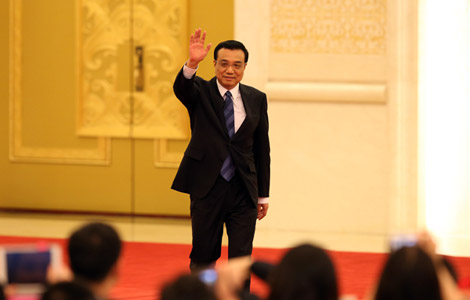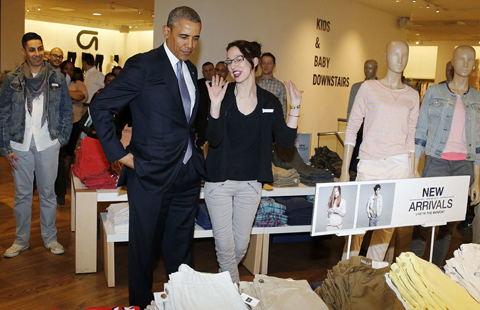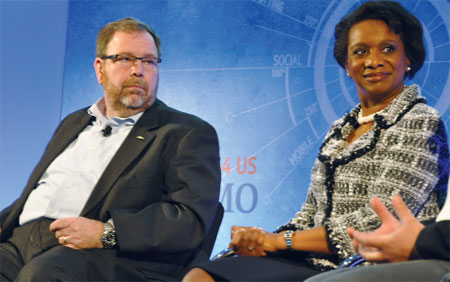Strategy is key to success in China: marketing chiefs
Updated: 2014-03-14 15:01
By Zhang Yuwei in New York (China Daily USA)
|
||||||||
|
Tim Mahoney (left), chief marketing officer of global Chevrolet and global GM marketing operations leader at General Motors Company, and Candace Matthews, CMO of Amway, speak on a panel about marketing strategies for China at the Big Rethink 2014 US conference on Thursday in New York. Zhang Yuwei / China Daily |
China's emerging middle class - growing and strong - creates numerous opportunities for international businesses in all sectors. These opportunities, however, also bring competition, and marketing strategies are key for these businesses to grow and sustain in China, according to a panel of chief marketing officers (CMO) from different global firms.
"There are so many opportunities, but the question really is: 'Where to go next'?" said Miguel Patricio, CMO of Anheyser-Busch Inbev, the world's largest brewer, at The Economist's Big Rethink 2014 US conference on Thursday.
"It's not about whether we should go to big places - where others go - it's about identifying where you have more chances to succeed," Patricio said.
Anheyser-Busch Inbev, which has about 25 percent of the global market, defines China and Brazil as the "right markets" where they are strongly positioned. The Belgian-Brazilian multinational beverage firm believes those two emerging markets, together with the US, help it keep a "balanced footprint" in long-term growth of profitability in both developed and emerging markets.
In China, one of the next big steps for ABInBev is investment in building breweries.
Among the six new ones the company will build in China, "one of them is on the coast, the other five include Yunan and Henan provinces".
While the giant brewer is betting big on China's market of 1.3 billion people - with some 300 million middle class - the company realizes the challenges.
"The challenge is really the fierce competition and the still fragmented market," Patricio said.
More than 75 percent of China's urban consumers will earn $9,000 to $34,000 a year by 2022, according to consulting firm McKinsey & Company.
But for many multinational companies, which are in China, the long-term strategy is brand building, especially for consumer goods.
China has become a top market for many foreign brands. It's now the biggest market for General Motors, which sells more vehicles here than in the US, its home base. About 60 percent of current sales for Chevrolet - one of GM's global marquees - are in emerging markets.
"For sure, China is an important part of our strategy, and it's still a matter of building awareness," said Tim Mahoney, the head of Chevrolet's and GM's marketing operations.
Awareness-building campaigns help Chevrolet - the 103-year-old brand - to reach more consumers in China, which became the brand's No 2 market globally last year, said Mahoney.
"So it means something's working over there," he said.
The brand's $560 million sponsorship of the Manchester United soccer team - where the brand's logo is emblazoned on sports jerseys - is expected to be well-received in China, which, together with other emerging markets, has nearly one-third of more than 300 million fans in the Asia-Pacific region.
"It's a chance for us to get people that you couldn't buy necessarily on TV," Mahoney said.
Amway, an American company that manufactures, markets and distributes consumer products, saw its global sales grow by $500 million last year to $11.8 billion, with about 40 percent coming out of China - the company's the No 1 market.
Candace Matthews, Amways' CMO, said their strategy is to "work together with the government".
On the main leadership team, Matthews said, it's critical that they have some senior leaders who know the government very well.
"Several of our top leaders have worked in the Chinese government before and were very instrumental in letting us understand how strong it was to build that relationship (with the government)," Matthews said. "It's that partnership that really worked very well for us."
Among the observations from these top global CMOs is that Chinese consumers are willing to try new things, which creates opportunities for their businesses.
"It's hard to make a generalization about Chinese consumers," Mahoney said. "But there seems to be a greater tendency to experiment and try new brands where in the past it was more traditional, conservative-oriented."
Chris Hosmer, managing director (Asia Pacific) of Continuum, a leading service design firm, said sustainability is vital for these global firms to think long term.
"It's not enough to be the first, the fastest or the biggest in the Chinese market," said Hosmer.
"That's not sustainable any more, you have to be relevant in a way that consumers will care a year or two years from now," he added.
yuweizhang@chinadailyusa.com
(China Daily USA 03/14/2014 page1)

 Travel-tourism forum advises US to 'loosen' visa requirements
Travel-tourism forum advises US to 'loosen' visa requirements
 Nose gear on plane collapses at Philly airport
Nose gear on plane collapses at Philly airport
 US Black Sea naval drills start near Crimea
US Black Sea naval drills start near Crimea
 Cooperation at the heart of win-win, Li tells world
Cooperation at the heart of win-win, Li tells world
 Prayers for missing flight MH370
Prayers for missing flight MH370
 US first lady promotes film
US first lady promotes film
 Who's got the No 1 Chinatown in the US?
Who's got the No 1 Chinatown in the US?
 Obama sweats over sweaters during shopping
Obama sweats over sweaters during shopping
Most Viewed
Editor's Picks

|

|

|

|

|

|
Today's Top News
Search for MH370 may expand to Indian Ocean
US Congressmen head to China to study new reforms
China, US 'should stress' mutual interests
Travel-tourism forum advises US to 'loosen' visa requirements
Strategy is key to success in China: marketing chiefs
US warns Russia of 'serious' steps
Feinstein gives a wake-up on spying
Satellite images not of MH370 crash: officials
US Weekly

|

|







